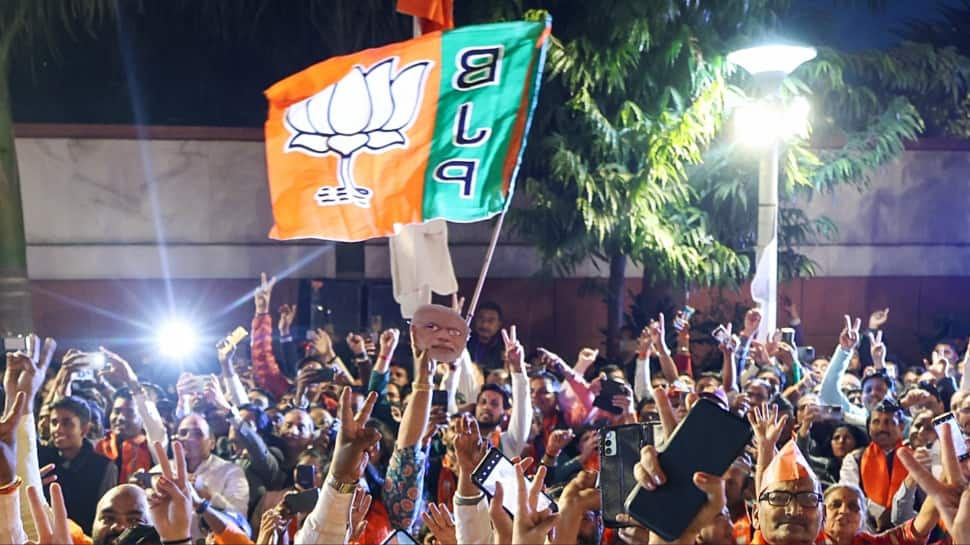 |
|
The recent Delhi Assembly elections resulted in a resounding victory for the Bharatiya Janata Party (BJP), ending the Aam Aadmi Party's (AAP) decade-long reign. The BJP secured a comfortable majority, winning 48 out of 70 seats, triggering speculation about the selection of the next Chief Minister. While several names are being discussed within the party, a notable aspect of the ongoing discussion centers around the possibility of Delhi having its first woman Chief Minister. This potential shift in leadership represents a significant moment in the political landscape of Delhi, and the potential candidates bring diverse backgrounds and experiences to the table. The BJP's success reflects a significant change in voter sentiment, highlighting the need for a detailed analysis of the contributing factors behind this electoral shift. The analysis should consider socioeconomic trends, the effectiveness of the BJP's campaign strategies, and the perceived shortcomings of the AAP's governance during its ten-year tenure. Further research into voter demographics and their motivations will provide a richer understanding of the BJP's victory.
Among the prominent names being considered for the Chief Minister's position are four women MLAs who emerged victorious in the recent elections. Neelam Pahalwan, elected from Najafgarh, is noteworthy for being the first woman MLA from that constituency. Rekha Gupta, a former Delhi University Students' Union president, won from Shalimar Bagh, showcasing her experience in student politics and leadership roles. Poonam Sharma, who secured the Wazirpur seat, and Shikha Roy, who defeated a senior AAP leader, Saurabh Bharadwaj, also represent strong contenders, each with unique strengths and experiences to contribute to the potential governance of Delhi. The possibility of a woman Chief Minister signifies a potential shift in leadership style, possibly reflecting a change in political priorities and a move towards more inclusive governance within the state.
However, the selection process is not solely based on gender. Media reports indicate that the BJP is also considering caste equations. Four BJP MLAs belong to the Scheduled Caste community: Raj Kumar Chauhan (Mangolpuri), Ravikant Ujjain (Trilokpuri), Ravinder Indraj Singh (Bawana), and Kailash Gangwal (Madipur). Balancing gender representation and fulfilling the party's commitment to social justice are key elements in this decision-making process. The selection of a Chief Minister from the Scheduled Caste community could further strengthen the BJP's commitment to social inclusion and inclusivity within its governance plans. This multifaceted selection process emphasizes the complexity and considerations involved in appointing a suitable leader for Delhi.
Despite the potential for a woman Chief Minister, Parvesh Verma, son of former Delhi Chief Minister Sahib Singh Verma, has emerged as a prominent contender. His victory against Arvind Kejriwal, the incumbent Chief Minister, has positioned him as a strong frontrunner. His post-election statements highlighted a commitment to transparent governance, development-oriented policies, and moving away from the previous administration's strategies. His political lineage and experience, coupled with his recent electoral triumph, present a strong case for his selection. However, choosing between a candidate based on merit and experience and a candidate who might address certain social and political priorities is a challenge the BJP is likely facing as it makes its decision. The ultimate choice will greatly impact the future direction of Delhi's governance.
The BJP's victory is a significant development with far-reaching implications for Delhi's political future. The decision regarding the next Chief Minister will shape the state's policy agenda for the coming years. The choice of a woman Chief Minister would have symbolic importance, potentially influencing the broader political landscape. The party must carefully weigh the various factors—gender representation, caste dynamics, political experience, and electability—to make an informed decision that satisfies party interests, promises accountability and reflects the will of the people. The upcoming leadership will face the task of addressing numerous challenges facing Delhi. This includes improving infrastructure, tackling pollution, and ensuring effective public services for its citizens. The selection of the Chief Minister is pivotal, setting the tone for the next phase of governance in Delhi and establishing its priorities in tackling these multifaceted challenges.
Source: Delhi Likely To Get Woman Chief Minister, Says Report — Check List Of BJP's Probables
